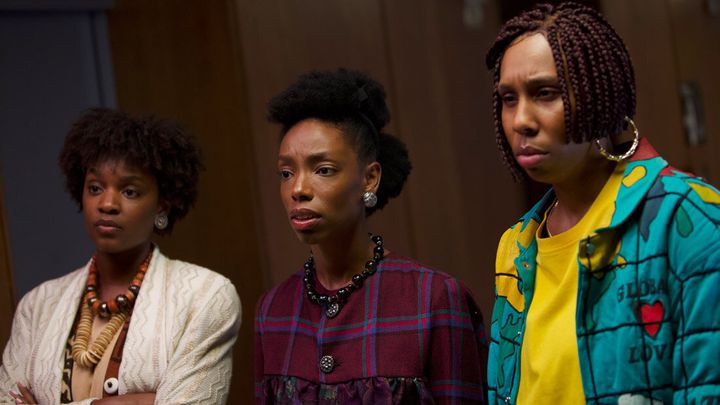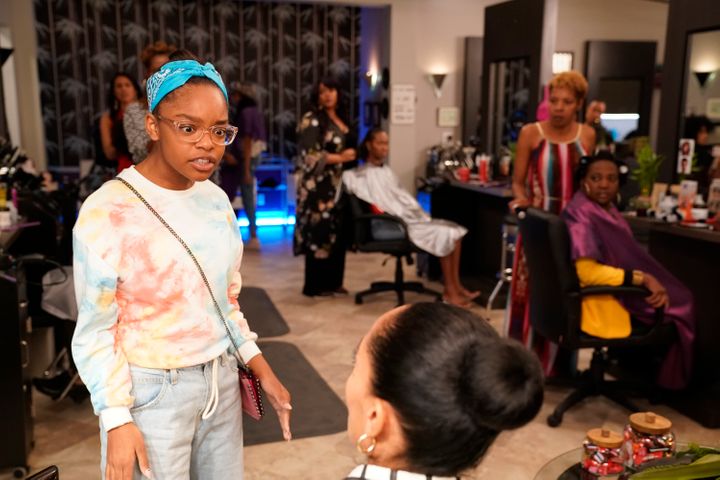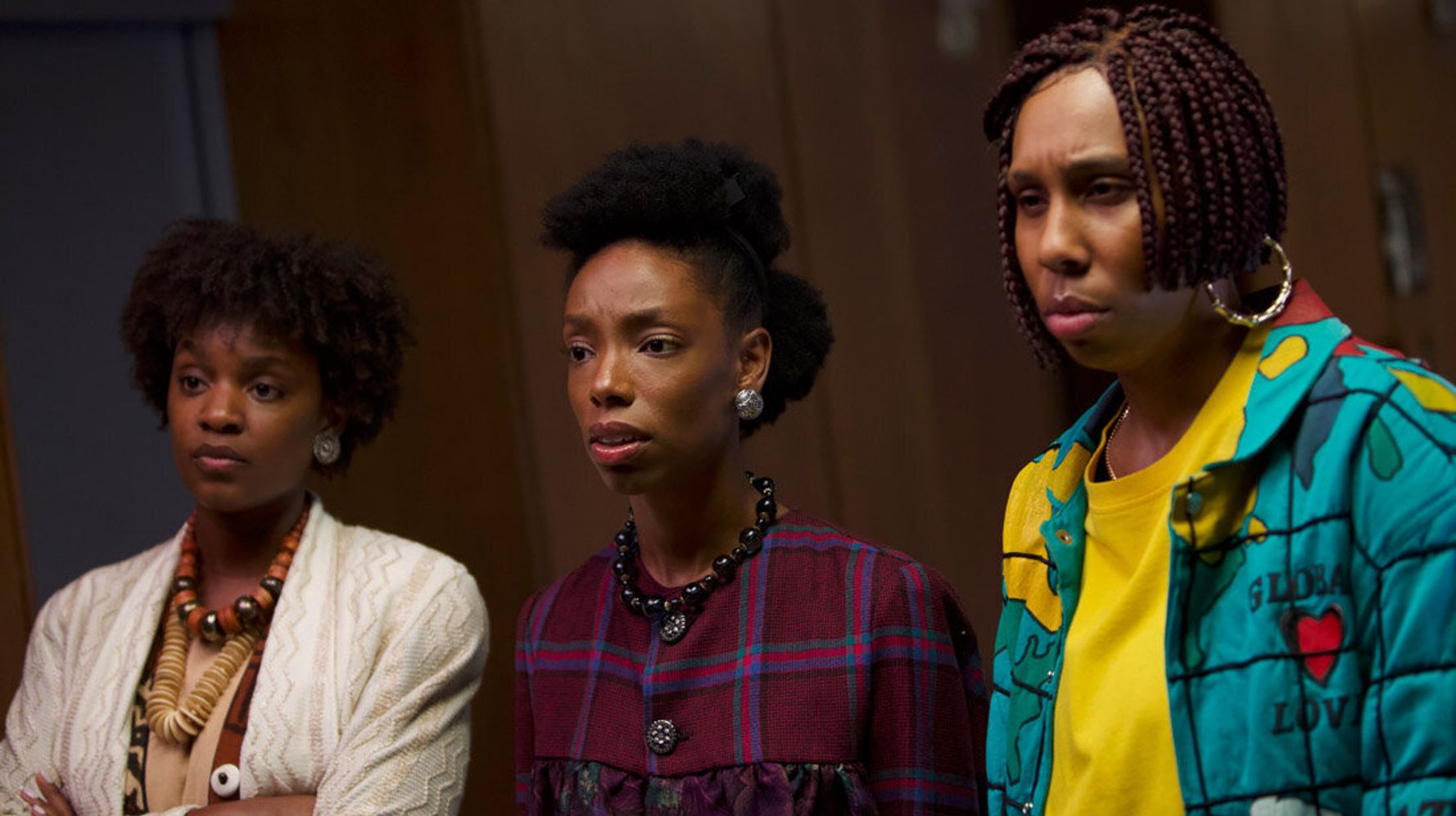[ad_1]
For the first half of the new horror film “Bad Hair,” writer-director Justin Simien effectively confronts the very real issue of Black hair criminalization. The film follows a young naturalista, Anna (Elle Lorraine), as she struggles to navigate her newly gentrified workplace. But just as quickly as the movie hooks particularly Black female audiences, it undercuts its own timely message. Anna’s freshly weaved hair — a result of pressure from her new superiors — swirls up into a diabolical force beyond her control and murders mostly innocent people, including naturalistas.
It’s not the first time we’ve seen Black women’s hair experiences awkwardly told through someone else’s gaze. Director Chris Rock’s 2009 documentary, “Good Hair,” attempts to investigate the social and cultural resonance of Black women’s hair — including imported weaves — but in a comedic tone that ridicules more than it educates. At one point, the filmmaker tells an Indian woman with long hair, “If you see a bunch of Black women, just run the other way.”
While it’s important for Black men to take part in the dialogue around Black women’s hair — from schools suspending Black girls for wearing hair extensions to the celebrities who celebrate their tresses in every form — storytellers like Simien need to ask themselves whether they are bolstering a stereotype or moving the conversation forward.
A more progressive example is writer-director Matthew Cherry’s Oscar-winning animated short, “Hair Love,” which takes a personal, empathetic approach to building a young girl’s self-esteem around her natural hair.
Simien’s film, which was acquired by Hulu shortly after its Sundance Film Festival premiere in January, fails to do the same. Set in 1989, “Bad Hair” uses a broader, clumsier method to convey a similar message. Though the movie addresses how natural hair discrimination in the workplace can affect Black women’s self-worth, it vilifies Black hair, similar to the way corporate America and the school system does, for the sake of entertainment.

It’s obviously a campy contribution to the horror genre, but “Bad Hair” deals with sensitive issues with such carelessness that it will undoubtedly turn off some audiences. It’s crucial that Black men like Simien — whose team of five producers only includes one woman, who’s white (Julia Lebedev) — commit to being better allies in the dialogue around Black women’s hair.
That includes checking their own biases at the door. For former army soldier Clarence McFerren II of Nashville, Tennessee, it took years — and his own hair journey — to acknowledge his prior judgment.
“I used to feel like when women wore wigs or permed hair, they were insecure or trying to be someone they weren’t,” he told HuffPost. “I respected a woman who had natural hair more because I felt like she was bold and didn’t care what anyone else thought.”
This sentiment is also shared in “Bad Hair,” which criticizes women who choose not to wear their strands in their natural state. But unlike Simien’s film, McFerren said he began to show compassion for all hair textures when he actually engaged with Black women about it.
“I started to see that it didn’t mean that [women who wore wigs or permed hair] weren’t courageous or proud of who they were,” the ex-military officer said. “They may have just wanted to switch it up or it was something to go with an outfit. It may be their artistic statement, and we should just let them live.”
Simien’s “Bad Hair” seems to have no compassion for Black women who prefer to wear weaves or straightened hair. Anna’s new boss, a Black woman named Zora (Vanessa Williams) who has blond, bone-straight hair, is the one who threatens Anna’s job because of her natural hair.
While that is an actual occurrence among Black women in the corporate space, Zora’s lack of backstory or three-dimensional characterization keeps her from having any layers that could explain her own journey and the sacrifices she could have made — culturally or personally — to ascend her career. She’s only denigrated.
That’s a common misperception about Black women who don’t wear their hair in its more textured condition, according to Darrius Peace, a stylist based in Birmingham, Alabama, who has specialized in natural hair for more than 20 years. When he first started doing hair in the ’90s, Peace said he got an earful from many clients who were older Black women like Zora and who faced serious repercussions for wearing their hair in its natural state to the office.
“They would talk about how they couldn’t wear braids to work because they would be reprimanded,” he told HuffPost. “They couldn’t wear locs or twists or Afros — because in the professional sector, Afros were perceived as political and really antagonistic toward the company.”
Though many business cultures have evolved to embrace natural hair in more recent history, someone who hails from an earlier era — like Zora — is wrongfully conditioned to perpetrate that stereotype through her younger employees. But that aspect is not given the complexity it deserves in the film.
The awful perceptions of natural hair are not restricted to the workplace — they are “deeply intracultural” among Black people, Peace said.
“A lot of the ridicule or defamation that people experience about their hair starts in the home or within the community where their mom or grandma is telling them not to go out with nappy hair,” he said. “But it wasn’t a conscious form of self-hate. It was survival.”

Simien struggles to incorporate messages like these in “Bad Hair,” which is written with such a peripheral grasp of these nuances. As the episode “Hair Day” of the ABC show “Black-ish” proves, there are ways to celebrate and even prioritize Black natural hair without castigating other styles or ignoring their deeply rooted histories. It’s critical that Black male storytellers are aware of this as they strive to illuminate Black women’s experiences on-screen.
Both McFerren and Peace said they realize that male voices are especially significant right now — if only to show that they stand by Black women no matter how they rock their hair.
“Black men are going to have to step up to protect the Black queen, her hair, and Black children,” McFerren said. “Otherwise, they’re going to start to believe these damaging social constructs.”
Peace agreed, adding that his relationships with the women and girls in his life have given him a greater awareness around how their hair is regarded both in the home and in popular culture.
“As a husband and father to a daughter, I edify Black women and let them know that they shouldn’t have to chemically compromise their hair to be perceived as beautiful or professional,” he said.
Being a real ally for Black women is about establishing a level of consciousness toward experiences you may not share, as well as doing the work to understand and appreciate the intricacies of their journeys. Otherwise, you end up with another misstep like “Bad Hair.”
Calling all HuffPost superfans!
Sign up for membership to become a founding member and help shape HuffPost’s next chapter
[ad_2]
Source link

